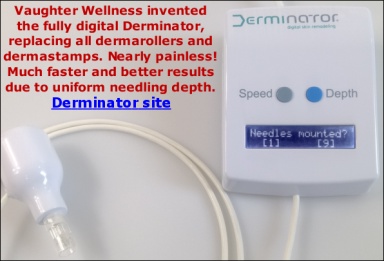> I'm in the US (NYC) and am thinking of buying some dermarollers from you.
> I read somewhere that you said zinc should not be used on skin when
> dermarolling. I use this for my daily sunscreen since i don't use
> chemicals on my skin. Do you suggest an alternative?
If you roll with long needles such as 1.5 mm you should completely avoid
exposing your skin to the sun for at least 2 days after the rolling (just like in the majority of laser treatments). You must wear a hat and use a high-factor sunscreen if you go outside.
It's alright to put Zinc oxide sunblock on but not immediately after dermarolling. Applying it the day after is OK.
(However it is much better to use any sunscreen including a zinc oxide-based one right after dermarolling than going outside unprotected from the sun - you could end up with hyper pigmentation. To offset the drying effect of zinc, just apply some cream to keep the skin moisturized and put the Zinc-based sun block on top).
Dermarolling triggers collagen production but rolling also temporarily compromises the protective skin barriers and the sun is very bad for your recovering skin at that vulnerable stage.
Zinc oxide dehydrates the skin. Zinc oxide is a mild astringent. An astringent is a substance that shrinks and constricts body tissues.
Zinc oxide acts as a skin-drying agent and can act as a skin anti-inflammatory. Astringents cause mild coagulation of skin proteins and that causes the skin to dry up.
Zinc's "drying" properties are very beneficial in treating diaper rash, oily skin with acne or any other skin condition where drying the skin is desirable. After dermarolling though, the "open" skin should be kept as moisturized as possible and that's why substances with astringent and dessicating (drying) properties are not suitable.
Additionally, Zinc has a mild anti-inflammatory effect and optimal collagen induction and elastin formation is achieved after the mild inflammation that rolling causes. that's the reason we roll: To cause a controlled inflammation.
Zinc oxide or titanium dioxide are excellent physical sun blocks. It works by covering the epidermis and reflecting the UV rays.
Another reason why you should stay away from your skin the first days is the risk of bacterial contamination. If your sunblock has been used for a while and it is not in the tube, its probably already contaminated by your hands etc. If your skin is intact it doesn't matter but you should be careful when the skin protective barrier is compromised and you should only use tubes - not jars - where the risk of contamination is very low. That's why we chose Infadolan, which is a medical grade regenerative ointment indicated for first degree burns.
> Second, I am going to buy some home rollers regardless of the answer to
> this question, but do you suggest getting an in-office treatment with a
> dermatologist before starting a home program or will the home program
> give results?
Nobody can guarantee results, also not of any in-office treatment.
There are people that underwent several in-office dermarolling sessions for their acne scars and they got disappointing results and there are people who roll themselves at home and they got good results. It depends on so many factors that we can safely say that a well-informed home-roller can get better results than a mediocre clinic can. Clinics are under time pressure and are there in the first place to make money (= getting you to return as often and as long as possible).
You can try to roll yourself and if you get no results, try in-office treatment. Either way, it is unrealistic to expect results too soon.






